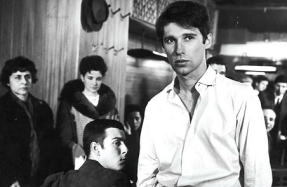
Spring break forever! Waylaid in Washington, DC on a class trip, freshman Lillian (Talia Ryder) pledges allegiance to the flag, blanks on Upton Sinclair’s name, ignores several famous stone memorials, and engages in some rote debauchery: ass-shaking, glass-raising, freestyling, cum-flinging. “The South shall rise again!” bellows blonde dumbbell Troy (Jack Irv), terrorizing a member of another visiting group. These Harmony-ous antics are played out, and the filmmakers behind The Sweet East know it. (Note that, contra the Indiewire review from Cannes, the film has a screenwriter—Nick Pinkerton, a film critic, programmer, and author making his feature debut—while the director is the well-known cinematographer Sean Price Williams). And so, no more than five minutes after introducing their disaffected heroine—and gifting her a solo, semi-diegetic musical number sung softly over the opening credits— Pinkerton and Williams plunge Ryder’s feline-eyed cipher into a cartoony QAnon intrigue: why, if it isn’t Andy Milonakis as a paranoid and heavily armed 4Chan truther, storming the capital in search of Clintonian sex traffickers! This wayward Pizzagater’s bullet-riddled arrival offers Lillian an opportunity to cut bait, but not before encountering scattered evidence of an actual sex ring being run out of a chain-restaurant basement: close-up on a forlorn, abandoned tricycle at the lip of some Gothic dungeon. It’s a broad but fleeting sight gag that positions Williams’ solo feature debut as a particularly knowing and contemporary provocation: ain’t I, it implores, a stinker?
For some critics and film-cultural commentators, The Sweet East arrives to the Quinzaine smelling of something pungent: its credits list as an executive producer one Jimmy Kaltreider, as per Politico a top aide to Peter Thiel, who himself once upon a time helped another gifted, up-and-coming director make his own politically ambivalent feature debut (Thank You For Nothing, Peter). As Williams says below, treating The Sweet East like a kind of ground zero for right-wing patronage in the history of American cinema—independent or otherwise—is selective and ahistorical to say the least, but the strident liberal-baiting on display still warrants comment. It places Williams’ film plausibly alongside Dasha Nekrasova’s The Scary of 61st (2021) in the vanguard of what somebody with more skin in the game (and a stronger constitution) than myself might call “Dimes Square cinema.” For all its flaws—including and especially its deliberately trollish tone—Nekrasova’s Epstein-themed satire channelled a certain post-millennial savvy in between its naughty nods to Polanski and Kubrick, limning the seductive, compulsory solipsism of a small, weirdly influential (and easily influenced) New York media cohort steadily K-holing itself into a state of ecstasy. The image of leggy, deadpan Betsey Brown writhing in desirous Adjani-style ecstasy beneath a junior-high-style shrine to Prince Andrew split the difference between Juvenal and juvenilia just finely enough to be funny—provocation as masturbation, grabbing herself (and the haters) by the you-know-what and smirking back at them with eyes wide shu.
Brown also appears in , alongside her notorious (2021) co-star/party monster Peter Vack as, respectively, “Betsy Ross Girl” and “George Washington Boy” (“Bible class begins at 6 p.m.,” chirps the latter in Founding Fathers drag to passerby near the Washington monument). That both are onscreen too quickly to register as presences offers a skeleton key towards unlocking is swift, horizontal, and digressive, gliding swiftly across a geographical and sociological topography it treats as a playground—with an emphasis, implied from the title on down, that it’s mapping (and sacramentalizing) its own Tri-State Area home turf.




